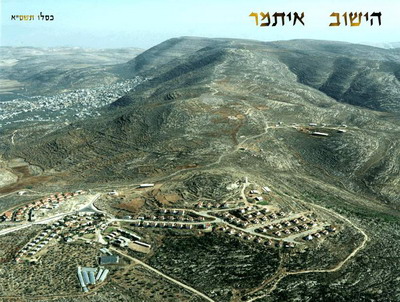NJN-40.
New Jerusalem News.
1 November 2011, 4 Cheshvan 5712
Contents:
1. David Jackson: Gilad Shalit Exchange Reflects Well on Israeli Values.
2. Israel Helps US Security, Say Ex-Clinton, Bush Aides.
3. Israel: Not Just a Strategic Asset, But a Strategic Bonanza by Robert Satloff
 |
Members of the Fogel Family from Itamar; Murdered (March 11, 2011) by Arab Terrorists for being Jewish .  |
|
Brit-Am Discussion Group |
Contents by Subject |
Research Recognition Reconciliation Contribute |
|
Site Map Contents in Alphabetical Order |
This Site |
1. David Jackson: Gilad Shalit Exchange Reflects Well on Israeli Values.
Yair,
I think it says a lot about the values of the state of Israel that they would pay such a high price to redeem one of their people, Gilad Shalit, from captivity. Can anyone imagine a Muslim state doing that' I'd have to agree that in a cost-benefit analysis this seems to be a mistake, but which kind of society would we want to be associated with?
Proverbs 13:21
Evil pursueth sinners: but to the righteous good shall be repayed.
David Jackson
Keller, TX
2. Israel Helps US Security, Say Ex-Clinton, Bush Aides
by Tzvi Ben Gedalyahu
From: Arutz Sheva <news@israelnationalnews.com>
Date: Mon, 31 Oct 2011 17:27:09 +0200
Extract:
Israel advanced American national security interests, according to a report by former aides to presidents Clinton and Bush that contradicts Obama advisors who claim that Israel endangers U.S. soldiers.
Robert D. Blackwill, who was deputy national security advisor for strategic planning in the administration of George W. Bush, and Walter B. Slocombe, undersecretary of defense for policy in the Clinton administration, wrote a brief summary of their research in the Los Angeles Times Monday morning.
The full report is entitled "Israel: A Strategic Asset for the United States" and was written for The Washington Institute for Near East Policy.
President Barack Obama has harped away at the theme that the United States and Israel share values of democracy and freedom, implying that the American government has a moral obligation to defend Israel. The theory has been the basis for the president and his advisors' declarations that Israel must agree to demands of the Palestinian Authority (PA) in order not to endanger American security.
Blackwill and Slocombe pointed out what they said is an overlooked aspect of the American-Israeli alliance: The many ways in which Israel advances U.S. national interests.
'The United States has benefited in the areas of counterterrorism, intelligence and experience in urban warfare," they wrote. "Increasingly, U.S. homeland security and military agencies are turning to Israeli technology to solve some of their most vexing technical and strategic problems."
Israel's support includes airport security techniques, unmanned aerial systems (UAVs), defense against short-range rockets and armored vehicle protection.
'Israel's national missile defenses ' which include the U.S. deployment in Israel of an advanced X-band radar system and the more than 100 American military personnel who man it ' will be an integral part of a larger missile defense spanning Europe, the eastern Mediterranean and the Persian Gulf to help protect U.S. forces and allies,' they stated.
Without providing details, the authors said that Israeli cooperation with the U.S. military has worked "to advance their common interest in defeating the terrorism of Hamas, Hizbullah and Al Qaeda and its affiliate groups, and preventing nuclear proliferation in the region.'
They did specify one instance ' Israel's passing on to the United States "conclusive photographic evidence in 2007 that Syria, with North Korean assistance, had made enormous strides toward 'going hot' with a plutonium-producing reactor."
Israel, without officially saying so, bombed the site in northern Syria three years ago.
.... they dismissed claims that the alliance with Israel has prevented the United States from establishing closer ties with Arab countries.
'Would Saudi Arabia's policies toward the United States, for example, be markedly different if Washington entered into a sustained crisis with Israel over the Palestine issue'' they asked. 'Would Riyadh lower the price of oil'... Would it view American democracy promotion in the Middle East more favorably'... No."
3. Israel: Not Just a Strategic Asset, But a Strategic Bonanza by Robert Satloff
Nixon Center debate ^ | 7/23/2010 | Robert Satloff ' Prepared Remarks
http://www.freerepublic.com/focus/f-news/2557649/posts
Extracts:
My task today is to make the case why Israel'and the U.S.-Israel relationship'is a strategic asset to the United States. In fact, I will go even further. I will argue that Israel, and the U.S.-Israel relationship, is'both in objective terms and compared to any other Middle Eastern relationship we have'a strategic bonanza to the United States. Not just an asset, but a bargain.
Let me make these points:
' It is to America's advantage to have a nation of friends, whose people and government are firm supporters of and advocates for American interests in the broader Middle East. I don't think there is anyone in this room who would disagree with the contention that there is no country in the Middle East whose people and government are so closely aligned with the United States; in some countries, the people are pro-American, in others, the government, but in Israel, it is unabashedly both. Our two countries share ways of governing, ways of ordering society, ways of viewing the role of liberty and individual rights, and ways to defend those ideals. Some realists tend to dismiss this soft stuff as having no strategic value; I disagree. This commonality of culture and values is at the heart of national interest; it manifests itself in many ways, from how Israel votes at the United Nations to how its people view their role as being on the front line against many of the same threats we face.
' It is to America's advantage to have in Israel an economy that is so closely associated with ours and that is such an innovator in the IT field, in high-tech medicine, and in green technologies, like the electric car. ... not only does Israel's fiscal responsibility (a situation that contrasts with other U.S. allies in Europe) mean that Israel is not part of this problem, but with its high-tech economy, Israel is actually part of the solution. Indeed, the strength of our relationship helped turn Israel from an economic basket case into an economic powerhouse' and our economic partner.
In the words of one knowledgeable observer: 'The peace process has been a vehicle for American influence throughout the broad Middle Eastern region. It has provided an excuse for Arab declarations of friendship with the United States, even if Americans remain devoted to Israel. In other words, it has helped to eliminate what otherwise might be seen as a zero-sum game.'
That sort of praiseworthy peace process was born out of the 1973 war, when two interlocking developments began to take shape 'the growth of the bilateral U.S.-Israel strategic relationship, which took off in economic and military terms, and the emergence of a peace process in its current, American-led form. Since then, the Arab-Israeli arena has changed dramatically in favor of U.S. interests.
And then there is the long list of military-related advantages that Israel brings to the United States directly, by its own actions and through the bilateral relationship. I will cite just a few:
' Since 1983, American and Israeli militaries have engaged in contingency planning, and Israeli facilities can be made available to the United States if needed. American forces have practiced the use of many Israeli facilities, ranging from Ben Gurion Airport to pre-positioning sites. All four U.S. armed services routinely conduct training at Israel Defense Forces facilities.
' The U.S. has deployed an X-band early warning radar for missile defense on Israeli soil. This facility supplements other American missile defense assets and is available for both America's regional missile defense architecture and our own reconfigured missile defense concept for protecting Europe from longer-range Iranian missiles.
' America began stocking war reserves in Israel fifteen years ago. Those stockpiles are hardly 'minimal''the total value is approaching $1 billion. They're U.S. property and the Pentagon can draw upon them at any time. America has shown it is able to move military supplies from Israel to the Gulf; for example, it sent Israeli mine-plows and bulldozers to Iraq during the first Gulf War in 1991.
' Israel can be an extremely useful location for strategic logistics or power projection in the eastern Mediterranean, and in fact the United States Navy has conducted countless port visits in Haifa in support of U.S. operations.
' Israel has proven to be a prime source of effective counterterrorism/counterinsurgency tactics, techniques, and procedures, which have played a significant role in U.S. success (thus far) in Iraq
' Israel has also been an outstanding innovator in the technology, tactics, techniques, and procedures of unmanned aerial vehicles, which the U.S. now relies upon so extensively in Afghanistan.
Add all this up: Israel'through its intelligence, its technology, and the lessons learned from its own experience in counterterrorism and asymmetric warfare'has saved American lives. And when you add to this Israel's unique counterproliferation efforts ' destroying nuclear reactors in Iraq (1981) and Syria (2007) ' Israel's contribution to our security is even greater.

Pleased with what you read'
Click Here to make an offering. |
Jerusalem News and New Jerusalem News.
